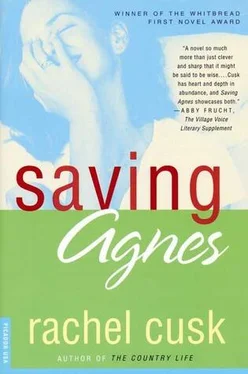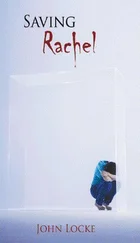‘So have you guys done it?’ said Greta, colliding in mid-air with the winged passage of Agnes’s thoughts.
‘Yes.’ Agnes considered the addition of ‘of course’, but settled for ‘We have, actually.’
‘Wow.’ Greta bit vociferously into an apple. ‘That was quick.’
Nina had once told her that if ever she felt her fancy turning to unhealthy devotion, she should imagine the object of her worship in the fifth form at a school disco: aged sixteen or thereabouts, skin crawling with adolescent pustulence, odorous and sweating and heaving himself drunkenly across the dance floor. Such a picture was bound to demote her demigod from the heaven realm to the human, or perhaps even lower, and was designed to relieve her from the discomforts of excessive admiration.
Such practices may have allowed Nina to become the cool and distant lover she was purported to be, but Agnes, although sensing an imminent need for such stringent measures, was not by nature an iconoclast. She had tried to imagine a time when she might have found him charmless and had only been able to picture him young and lovely in a distant corner; aloof from the malodorous crowds, desperate to get away and sit beneath the moon, writing poetry perhaps. Such trains of thought, furthermore, inevitably led to the contemplation of her own ungainly youth, which, had she shared its details with her lover, she felt sure would have had the effect on him which Nina’s suggestion had designed.
John had used to solicit tales of her adolescent embarrassments with glee. He had loved all her uglinesses and seemed to delight in the evidence they gave of her humanity. Once, when she had fallen over and cut her knee, he had watched her pick off the scab and had taken the crusty flap of skin from her hand. Agnes, who had thought she was removing the hideous excrescence unobserved, cried out in protest and shame. To her horror, and later wonderment, he held it up in the air for a moment and then put it in his mouth.
‘There,’ he said, smiling and swallowing calmly. ‘Now I know what you taste like.’
‘What shall I wear?’ said Agnes, standing dolefully before her wardrobe.
‘Where?’
Nina lay down on the bed and kicked off her shoes. One landed in the bin and the other hit the wall, leaving a small black mark.
‘Yes.’
Agnes ran her hand along the rail where jackets and shirts hung like obedient ghosts, like escorts.
‘You don’t say “yes”.’ Nina screwed up her face. ‘You say “to the cinema” or something.’
Agnes took out a jacket and held it up. It hung elegantly from the scrawny neck of the coat-hanger, svelte and poised. It looked better without her.
‘I’m going to the cinema with Jack, actually,’ Nina continued. She stretched her legs into the air and twiddled her bare feet on their joints like flesh-coloured periscopes. ‘Tomorrow. You know what he said when I suggested it? He said, “Oh, great, we can sit in the back row and snog.” Can you believe that? It was so funny.’
Agnes replaced the jacket and it eyed her with disdain. She did not want to look glamorous. He would think she was trying too hard, although in reality it would be equally laborious for her to appear unadorned. There was little that taxed her art more than having to imitate nature.
‘I mean, I thought he was really gormless when I first met him but now I realise he’s just — well, honest. He doesn’t go in for behaviour. He just says what he wants. That way, everyone knows where they stand. I feel like he’s undermining my preconceived stereotypes all the time, which is quite a challenge.’ She yawned. ‘Especially since I didn’t think I had any.’
‘What shall I wear?’ said Agnes. Her voice was now tinged with panic. Nina looked up.
‘Oh, for God’s sake,’ she said frostily. ‘Just wear anything. He won’t even notice.’
They had gone to the Science Museum once. Exhibition Road on a rainy Sunday afternoon evoked childhoods not spent there, a sort of displaced nostalgia for tea and cakes and nanny in the schoolroom. At times like these, wet leaves from Kensington Park clinging to her shoes like beggars’ hands, the smell of bonfires besieging her nostrils, Agnes felt the force of a cultural memory take hold of her that was not her own. They had had tea and cakes in the small East Anglian town where she had grown up, but they had come from Sainsbury’s in packages and had made her feel sick in a way she was sure the steaming scone of yore wouldn’t have. Such disappointments were the fault of the Victorians, she thought, looking at diminutive knickerbockers in the V & A. Her strange regressive longings were always firmly rooted in that age, while other historical daydreams were enacted via the persona of an adult male in doublet and hose.
Some time later, John suggested they move on to Science and Technology. Although just across the road, this edifice of concrete and plate glass was a world apart. Wandering the pale-floored forecourt studded with sculptural confections of plastic and steel like invaders from another planet, Agnes felt somewhat alien herself. The room was packed with self-possessed children dressed in primary colours.
‘This is crap,’ said one small blond specimen, pressing buttons and twiddling knobs with expert indifference while lights flashed and vast plastic molecules spun. Agnes was relieved they had not visited Natural History, where similar lights flashed in ominous patterns of invasion over diagrams of prostrate female thighs and pubic jungles.
‘Agnes!’
John was examining a dimly lit booth on the far side of the room. As she approached, she saw he was seated in front of a large pane of glass and he motioned with his hand for her to sit in the vacant chair on the other side. She sat down opposite him. In the dark glass she could see her own reflection.
‘Watch this,’ he said softly.
Her own reflection suddenly melted, to be replaced by his face grinning at her through the glass.
‘How did you do that?’ she queried.
‘Light,’ he replied. ‘The button on your right adjusts the light.’
He turned it again and her own face reappeared. It was odd to see them occupying the same space, their heads floating disembodied in and out of the dark, under and over each other like symbiotic beings, like split personalities.
‘Now watch this.’
He loved to surprise her, to entertain her with his mastery. She would, he knew, never think to press the buttons herself. That was one of the reasons why he loved her. She let him show her things.
‘What are you doing?’ she said.
All at once, she saw there was something wrong with her face. The eyes weren’t hers. John began to laugh behind the glass. Her mouth seemed to be laughing with him. Her jaw suddenly appeared to have become unusually square.
‘Stop it!’
Her mouth moved again. Part of her was still there, but altered, like the face of a long-lost relative. The other part was John. He was in her eyes, across her forehead, around her chin. He was sitting in her head, rubbing his hands together gleefully. He had somehow found the space between them and he had rented it out like an apartment.
‘You see?’ he said. ‘Do you see how wonderful this is? This is what our children would look like.’
WHEN she was younger Agnes had wanted to be a boy, a fact which, like a South African passport or an inherited income, she had since expended much energy in concealing lest it expel her from the warm embrace of her ideological family. Now the world of men seemed distant and barbaric, but Agnes was unnerved to find that sometimes, observing from her hill-top the shaking spears and strange customs of this rival tribe, she was besieged by sensations of longing and familiarity. In the face of such uncompromising anthropological perspectives in her own camp as Nina’s (who, when questioned on the problematic issue of cohabitation between the species, had replied: ‘Why would a panda suddenly go off and live with a giraffe?’), Agnes feared that, unable to conform to the specifications of either side, she would be deserted by both. The deep-seatedness of her anxiety was revealed to her once in a dream, when she had found herself in possession of a giant penis like an elephant’s trunk and was forced to bundle it up beneath her skirt like a dark and terrible secret and walk around in mortal fear of its discovery.
Читать дальше












